Indexing
![]()

This issue of The Researcher Journal for Legal Sciences, published under the vision of the College of Law at the University of Fallujah, reflects the journal’s commitment to advancing high-quality legal research at both national and international levels. All contributions have undergone rigorous peer review by qualified academic experts, ensuring scholarly integrity and transparency. The issue presents diverse studies addressing contemporary legal challenges across multiple fields of law, including criminal, civil, commercial, constitutional, administrative, and personal status law. Particular attention is given to emerging legal questions related to modern reproductive technologies and remote litigation, especially in the context of electronically concluded commercial contracts. The journal continues to welcome original legal research from scholars within Iraq and internationally, in line with its mission to promote academic openness and strengthen collaboration with the broader legal research community and study.
Prof. Dr. Saad Hussein Abdul Al-Halbousi
Editor-in-Chief
December 2025

The Researcher Journal for Legal Sciences continues to advance its scientific and academic mission by publishing high-quality scholarly contributions in the field of legal studies. To foster engagement with both the Arab and international legal communities, the journal places particular emphasis on publishing the work of professors and researchers from diverse Arab and foreign institutions, in line with its vision and strategy of promoting the exchange of legal knowledge. Now reaching Volume 6, Issue 1, the journal reaffirms its commitment to academic excellence. As part of its established process, all submitted manuscripts are subjected to rigorous expert evaluation and objective peer review to ensure their suitability for publication.
The journal has also been steadfast in its pursuit of inclusion in international indexing repositories. This effort is supported by the continuous development of its publishing system and adherence to the scientific standards upheld by leading international journals in the field of legal research.
This issue reflects the journal’s commitment to academic openness, presenting a diverse selection of research papers authored by scholars from both within and outside the Republic of Iraq. The contributions span a broad range of legal topics and disciplines. Foreign contributions are presented in a dedicated section, while Iraqi researchers’ works are also well represented. The featured articles include:
The Duality of the Criminal Rule in Iraqi Law
The Crime of Aggression against Public Money in the Saudi System
Mechanisms of the United Nations for Achieving Cybersecurity and Their Impact on Iraqi Legislation
Biosecurity in International Law
Self-Interests of Security Council Members and Their Impact on Acceptance of Membership in the United Nations (The Palestinian Issue as an Example)
Constitutional Regulation to Protect the Right to the Image
Re-engineering the Iraqi Council of State: A Comparative Study
The Extent of Artificial Intelligence Application in Combating Tax Evasion in Iraq
The Role of Digital Transformation in the Development of the Performance of the Financial Authority in Iraq: A Comparative Study
The Acceptable Requirement of the Iraqi Legislator: The Marital Home in the Crime of Adultery of the Husband
Through these contributions, the journal aspires to deliver meaningful scientific value, opening avenues for deeper reflection on pressing legal issues, while also enriching the work of practitioners, policymakers, and researchers in addressing contemporary challenges through research and study.
Prof. Dr. Raed Naji Ahmed
Editor-in-Chief
June 2025
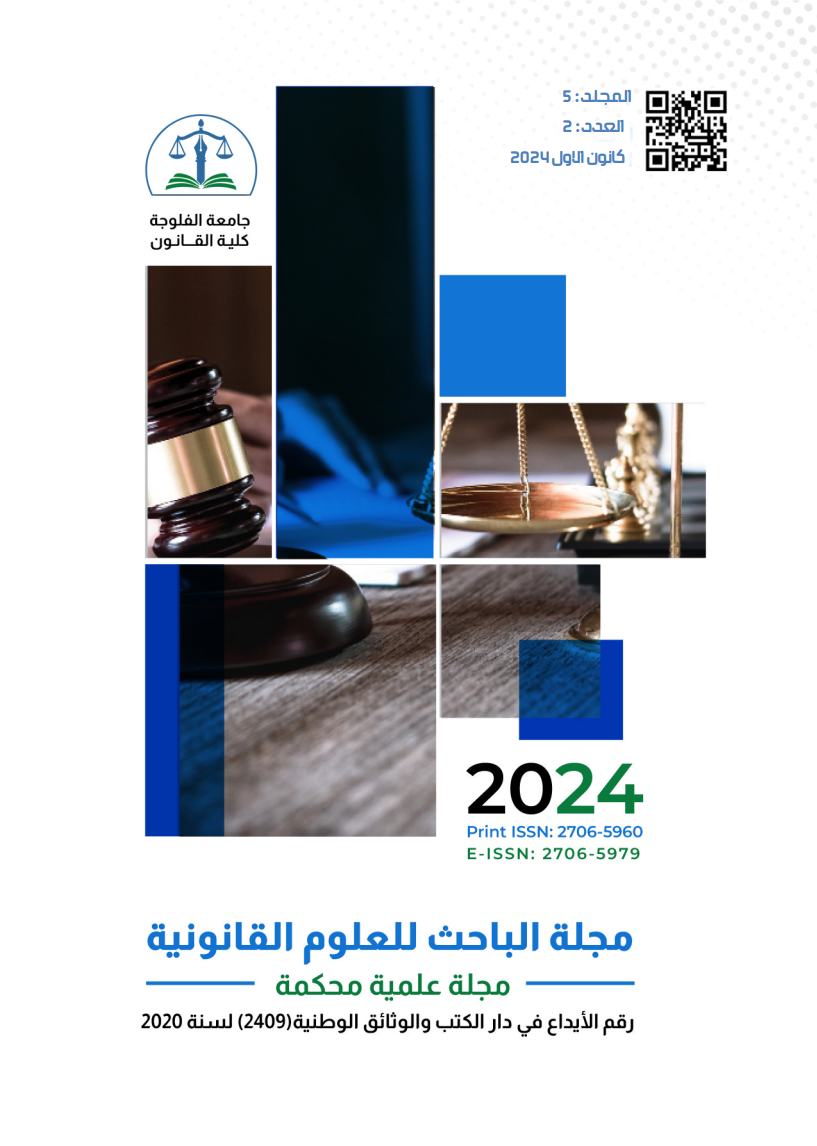
The Researcher Journal for Legal Sciences is steadily progressing through its scientific and academic activities by publishing scientific and academic outputs in the field of legal studies. In order to engage with the Arab and international legal community, the journal has given special importance to publishing academic research by professors and researchers from Arab and foreign countries, supporting its vision and strategy for the exchange of scientific output. The journal continues its academic contribution, now reaching Volume 5, Issue 2. As is customary for the journal and its system, the submitted papers undergo scientific expertise and objective peer review by experts who determine their suitability for scientific publication. The journal has spared no effort in its tireless pursuit of being indexed in global repositories, through the development of its publishing system and the adoption of scientific standards followed by the most prestigious international journals in the field of legal research.
This issue aligns with its goal and desire to achieve academic openness, as it includes a collection of research papers from researchers outside the Republic of Iraq. The topics and contents of these papers are diverse across various fields of legal research. It also includes several research papers by Iraqi researchers, with the foreign research papers listed under the section for non-Iraqi researchers. The titles and topics of these papers vary in specialization and scope. The first paper is titled "The Classification of Inmates in Reform and Rehabilitation Centers According to the Nelson Mandela Rules," while the second is "Social Justice in Positive Law: An Analytical and Philosophical Study." The third paper is "Bullying in Public Sector Employment and its Criminal Response: A Comparative Analytical Study," and the fourth paper is "The Legal Organization of Redemption Sales in Iraqi and Jordanian Law: A Comparative Study." The fifth paper is titled "The Role of Interdisciplinary Studies in Establishing the Foundations of Technical Criminal Law: An Analytical Study." The sixth and final paper from non-Iraqi researchers is "The Legal System of Banking Acquisition in Jordanian Law."
As for the research from Iraq, the topics are diverse in their content. The first paper is titled "The Law on Ratifying the Khawr Abdullah Agreement No. (42) of 2013 and its Compatibility with the Provisions of the Iraqi Constitution and the Decisions of the Federal Supreme Court." The second paper is "The Provisions of the Winning Deal in Pledge of Possession: A Comparative Analytical Study," and the final research paper is "Mechanisms for Obtaining Digital Evidence and Using It as Evidence in Cybercrimes."
We hope that these outputs will provide scientific benefit, opening avenues for thought and reflection on legal issues, or enrich law practitioners, implementers, and researchers in finding solutions to real-world problems through research and study.
Prof. Dr. Raed Naji Ahmed
Editor-in-Chief
December 2024
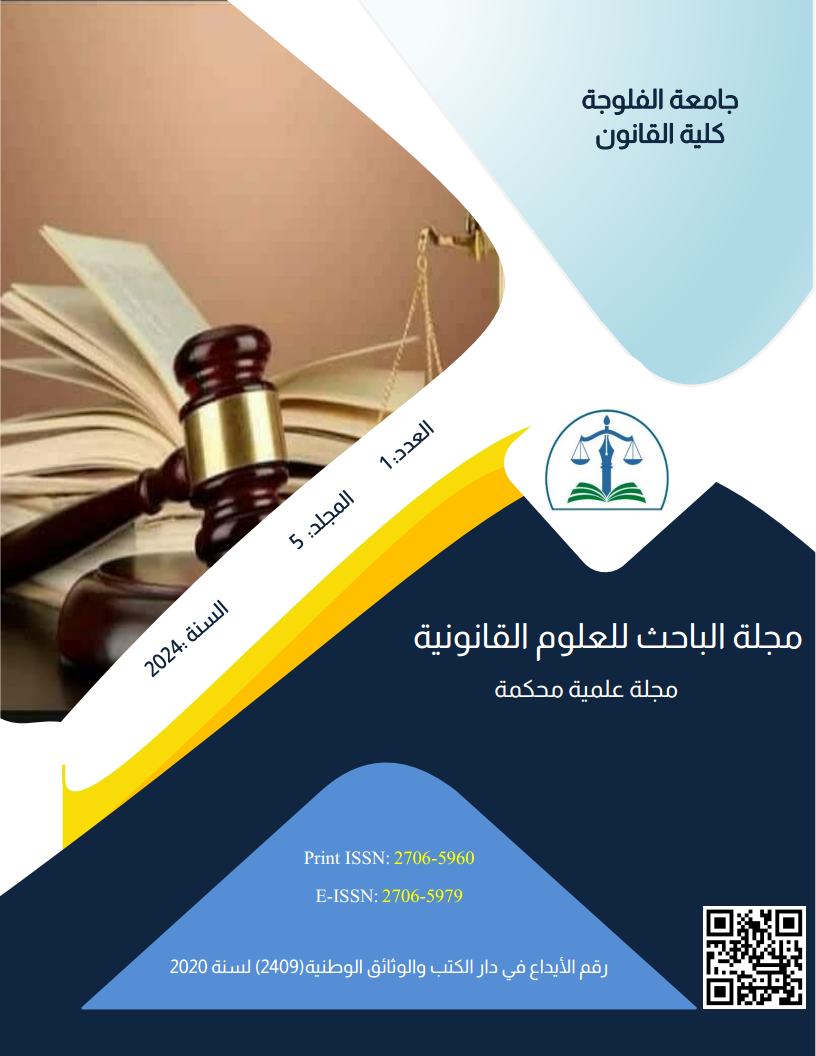
The Journal of Researcher for Legal Sciences continues to enrich the academic and legal community with a variety of scholarly fruits. With this issue, the journal reaches its fifth volume and first number. The journal maintains its established tradition of publishing only rigorously reviewed, where all submitted papers peer-viewed to insure their quality before accepting them for publishing. The journal's transparent and publicly available editorial policy, clearly outlined on its website, ensures a high standard for all published content. This issue presents a diverse collection of academic and scientific works in the field of legal studies. While the specific topics vary, they all share a common thread: they represent mature and well-researched contributions that will undoubtedly benefit readers, researchers, and legal scholars alike. Articles in this issue cover both private and public law.
In the terms of the private law, the articles explore a number of topics, including: (honorary contracts in civil law between contract and non-contract.- analytical study), which is the first topic in this issue, it examines problems of honorary contracts- The second topic title is (Reforming the tort liability system of superordinate for the actions of Subordinate) which shows the need for reform in the legal system of civil liability. The third topic is (Determination of the legal personality of conjoined twins -Comparative study with Islamic Jurisprudence), which explores the legal status of conjoined twins. Another article about the legal implications of digital banking services titled (Digital banking service - a comparative study). Another topic titled (Legal effects of property usurpation by state departments -judicial study). The issue also delves into the challenges and implications of artificial intelligence, it contained two topics; the first title is (Towards the Development of the compensation system in civil liability for artificial intelligence). The second is (The personal rights of the robots). Turning to the public law, a single article addresses an overlooked issue in the Iraqi constitutional law, under title (Ignoring the legal regulation of the state order in the Iraqi constitutional judiciary- a comparative study).
The journal issue also contained summaries of the college's academic activities during the second course of year 2023-2024, including seminars, the first one is titled (homosexuality from legal and religious perspectives), the second is (The public budget in Iraq, between economy and law), the third seminar titled (Supporting investment in residential campuses and the legal protection of the consumer). In conclusion, we hope that these scholarly contributions will stimulate thought and provide practical solutions to real-world legal challenges.
Editor-in-Chief
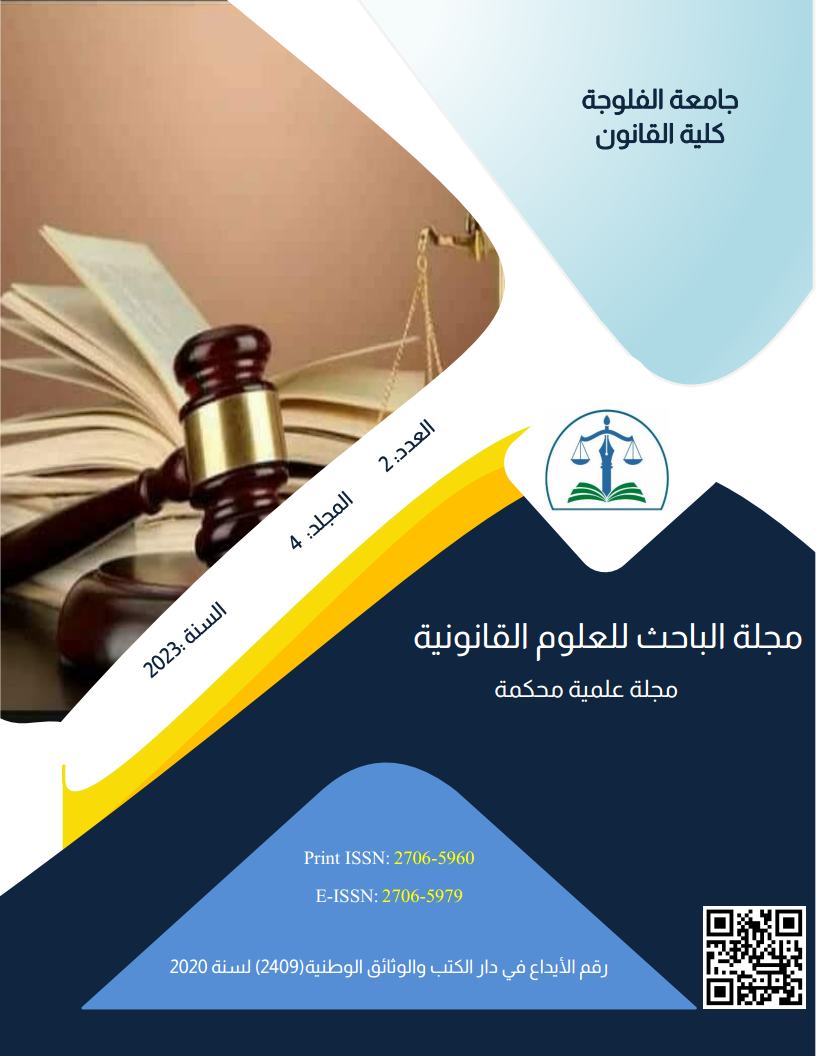
It is necessary to say that (Researcher Journal for Legal Sciences) has adhered to conditions and rules that were characterized by objectivity, and its primary goal was to consolidate scientific research according to pre-defined mechanisms, including evaluation controls, expertise, publishing rules, correspondence procedures, research tracking, and electronic research requirements. The journal's editorial management was keen to implement it to the letter so that the journal would truly be a home for purposeful scientific production that is not mixed with impurities and is not affected by suspicions of scientific theft , in addition to following clear and objective procedures in submitting research and evaluation by relying on disciplined, transparent, impartial and confidential mechanisms. Its goal is to give confidence to the author of the sober research that his well-thought-out idea will find purely scientific evaluation tools far from all aspects of ugliness or intellectual distortion, and at the same time to reassure the relevant scientific and academic bodies. , especially the specialized scientific promotion committees in the various faculties of law (at home and abroad). What is published in the magazine is solid and valuable research, such that it meets the description of a peer-reviewed journal in terms of its truth and truth. Therefore, we can state, in support of what was mentioned above, that many of the research papers submitted to the magazine were rejected after they were sent to specialized experts who indicated that they were not suitable for publication. Also, there are research papers that were subject to evaluation and modification based on the observations sent by the scientific expert, so they did not have a share in the list. Journal entries only after the researcher takes them into consideration and reconsiders them, especially since the journal's editorial management was keen to review the relevant scientific expert so that he could grant publication permission for the research and to ensure that the researcher took into consideration all the amendments and observations previously mentioned in his scientific report so that the research would acquire its required scientific requirements. All of this is in recognition by the editorial board and editor-in-chief of the magazine that distinguishing between the bad and the bad in scientific research is the basis for the magazine's accreditation and an advancement in its solid intellectual output .
In the same way as previous issues of the magazine, this issue contained various and different scientific research in various branches of private and public law. In private law, the research was tagged (regulatory change of the contract - an analytical study -) as well as (the problems of investment guarantees in oil service contracts - an analytical study A comparison in light of oil licensing round contracts) as well as the research tagged (financing the capital of the bank deposit guarantee company - a legal study in light of the effective Iraqi bank deposit guarantee system). As well as (voluntary liquidation of the bank - a comparative study -).
As for public law, the research was tagged (the legislative role of the constitutional judiciary in monitoring legislative negligence - a study in Iraqi law and Egyptian law) and (the obligation of the public employee not to disclose the secrets of public office), as as well as (punishment in law and Sharia) and (the crime of recruiting children during conflicts). armed forces ).
Judicial rulings had a place in this issue through commentary on them and a statement of the jurisprudential opinion regarding them, as the issue included two important comments on those rulings.
Editor-in-Chief
Amid the release of Volume 4, Issue 1 of Researcher Journal for Legal Sciences, we reaffirm the journal’s academic policy of publishing research that addresses real-world legal issues. Researchers tackle these issues through rigorous academic methodology to provide appropriate solutions, with innovative ideas that contribute meaningfully to scientific inquiry—worthy of being placed in the hands of students and scholars.
This issue was published as a result of the submission of scientific papers that met the required academic criteria and adhered to sound research principles, making them clear evidence of the journal’s transparent, neutral, and objective editorial approach—immune to any criticism or doubt.
Notably, a significant portion of this issue is devoted to specialized research in intellectual property, which is due to the journal’s editorial policy to publish selected papers presented at the First International Scientific Conference organized by the college on March 15–16, 2023, under the title “Intellectual Property: Contemporary Issues and Legal Solutions.” These papers underwent the journal’s established review mechanisms and plagiarism detection procedures to ensure compliance with its publishing standards.
Accordingly, the research papers included in this issue can be divided into two categories:
Papers not related to intellectual property, including:
Legal obstacles to investment in Iraqi law
Analogy in inheritance matters: Necessity and method—A comparative study under the current Iraqi Personal Status Law
Constitutional principles governing the parliamentary electoral system in the 2005 Constitution of the Republic of Iraq
The legal nature of intelligent robots: An analytical comparative study
Papers focused on intellectual property rights, including:
Expedited commercial arbitration under WIPO rules
Unregistered inventions: Rights and protection
The objective approach to civil liability for artificial intelligence activities
Intellectual property and the government’s role in its protection
The role of artificial intelligence in tax transactions
Financial penalties for violating intellectual property rights
In conclusion, we pray that the research in this issue offers a meaningful contribution that enriches legal scholars and students in the fields explored.
Editor-in-Chief
Prof. Dr. Raed Naji Ahmed
June 2023
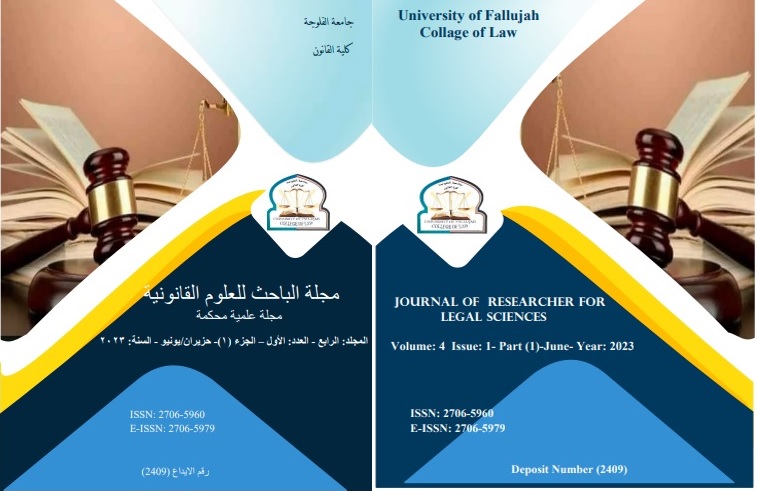
Amid the release of Volume 4, Issue 1 of Researcher Journal for Legal Sciences, we reaffirm the journal’s academic policy of publishing research that addresses real-world legal challenges. Researchers engage with these issues through a rigorous research methodology to present suitable solutions, ensuring that the ideas are innovative and contribute meaningfully to the body of scientific knowledge—worthy of being placed in the hands of students and scholars.
This issue was published following the submission of scientific papers that met the required academic standards and adhered to proper research principles, making them clear indicators of the journal’s commitment to a transparent, impartial, and objective editorial process—free from bias or doubt.
Continuing from the research published in the first part of this volume’s first issue, the second part includes a diverse set of studies. Some are connected to the specialized research in intellectual property, reflecting the journal’s editorial policy to publish select papers submitted to the First International Scientific Conference held by the college from March 15–16, 2023, under the title “Intellectual Property: Contemporary Issues and Legal Solutions.” These papers underwent the journal’s established review procedures and plagiarism checks to meet the legal and academic standards required for publication.
Accordingly, the research in this issue falls into two categories:
Papers submitted directly to the journal, including:
Civil liability of the voluntary paramedic
The evidentiary value of unlawfully obtained evidence in administrative investigations
The lease of a partner’s undivided share: A comparative study between civil law and Islamic jurisprudence
Granting Iraqi nationality based on jus sanguinis from the mother
Papers on intellectual property, including:
Intellectual property between the dominance of the economic dimension and the significance of the human dimension
The legal nature of artificial intelligence systems and their impact on civil liability – A comparative study
The intellectual rights of the missing person and their protection – A legal and jurisprudential study
In conclusion, we pray that the studies in this issue offer a meaningful contribution that enriches students of law and deepens their understanding of the legal topics discussed.
Editor-in-Chief
Prof. Dr. Raed Naji Ahmed
August 2023
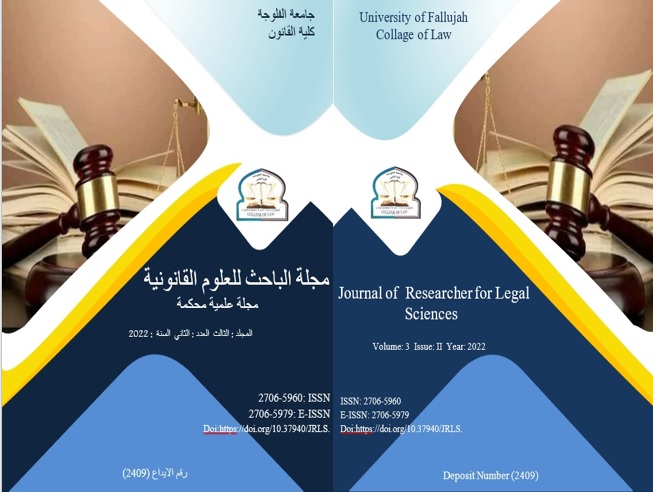
There is no doubt that intellectual output—particularly academic work—finds its true resonance in a book or a research paper published in a specialized scientific journal that adheres to regulations and conditions preserving the rights and intellectual property of the work. In this journal (Researcher Journal for Legal Sciences), conditions and rules have been set that are characterized by objectivity, with the primary aim of enhancing scientific research according to predefined mechanisms. These include evaluation criteria, expert reviews, publication guidelines, correspondence procedures, research tracking, and electronic plagiarism detection requirements. The journal's editorial management has strictly implemented these regulations to ensure that the journal genuinely becomes a haven for purposeful scientific production—untainted by any impurities or suspicions of academic plagiarism.
Additionally, the journal follows clear, objective procedures for research submission and evaluation, relying on disciplined, transparent, impartial, and confidential mechanisms aimed at instilling trust in researchers that their work will be assessed by purely scientific standards, free from bias or intellectual distortion. At the same time, it assures relevant academic and scientific institutions—particularly academic promotion committees in law faculties (both local and international)—that the research published in this journal is rigorous and valuable, meeting the standards of a peer-reviewed journal in both name and substance.
In support of the aforementioned, it can be affirmed that many research papers submitted to the journal have been rejected after being reviewed by specialized experts who found them unsuitable for publication. Additionally, some papers underwent revisions based on expert feedback and were not accepted into the journal until the authors implemented the required changes. The journal’s editorial management ensured that the expert reviewer was consulted once again to approve the publication and verify that the researcher addressed all previous notes and comments so the paper could meet the necessary scientific standards. This all stems from the editorial board’s recognition—along with the managing editor—that the ability to distinguish between quality and poor research is the foundation of the journal's credibility and the key to elevating its scholarly output.
Following the format of previous issues across the journal’s three volumes, this issue contains a diverse and rigorous collection of scientific research in various branches of both private and public law. In private law, the issue includes papers titled: The Application of Lease Provisions to Joint Ownership Agreements, The Effect of Gender Change on Personal Status Issues, Polygamy in Private International Law: Cultural Conflict and Conflict of Laws, Reflections on the Commercial Agency Law No. 79 of 2017, and Combating Illicit Gain – A Comparative Study.
In public law, papers include: The Legal System of the Administrative Judiciary – A Comparative Study Between Iraq and Egypt, Crimes Against Working Women – A Legal Study in Light of the Iraqi Labor Law No. 37 of 2015, and Violations by Private Military and Security Companies of International Humanitarian Law and Human Rights – Iraq as a Model.
Judicial rulings also had a place in this issue through commentaries and legal opinions, with the featured commentary titled: Spousal Support for a Non-Rebellious Wife.
Professor Dr. Raed Naji Ahmed
Editor-in-Chief
December 2022
The series of special issues of Researcher Journal for Legal Sciences continues into its third year with the release of the first issue of Volume Three. This issue adheres to the scientific and technical standards required for publication, featuring academic research and intellectual contributions in the field of law that have been measured by the necessary standards of scholarly evaluation and assessed according to strict academic rigor. As a result, these works were accepted and granted the scientific designation qualifying them to be published and made available to readers, including researchers, writers, and thinkers.
Conversely, there were papers submitted to the journal that the editorial board decided not to accept after they were rejected by academic reviewers. This serves as further evidence of the journal’s consistent policy—since the release of its very first issue in Volume One—that rigorous scientific production is its central goal, guiding everything it publishes. This policy is transparent, public, and clearly stated on the journal’s official website, and it is faithfully adopted by the journal’s editorial management.
As noted previously, this issue includes a number of research papers that met the required standards, covering various branches of both public and private law. We begin by highlighting some of the legal and intellectual contributions that researchers and readers will find in this edition.
In the field of public law, the issue opens with the article titled Criminal Protection of a Person’s Reputation from False News and Perjury, where the authors address the legal challenges of false information as a criminal act. Another paper, Balancing International Obligations and Domestic Legislation to Combat Human Trafficking, explores how to align international and domestic legal frameworks to reduce and combat human trafficking.
In the context of international environmental protection, the issue includes Reducing Mercury Emissions into the Atmosphere under the Minamata Convention on Mercury of 2013. On contemporary constitutional matters, the paper The Nature of the Federal Supreme Court Law and Its Substantive Rules delves into doctrinal legal treatments. Returning to criminal law, particularly criminal procedural law, the paper The Legal Value of Evidence Based on Flawed Procedures in Iraqi Legislation investigates the validity of flawed criminal evidence.
Turning to private law, one of the most notable studies in this issue, which tackles pressing or recurring legal challenges, is The Problem of Diverging Legal Terminology in Arab Commercial Legislation. Another is The Role of Investment Companies and Financial Funds in Building a Securities Portfolio – A Comparative Study. Additionally, the paper The E-Consumer’s Right to Access Information in Information Contracts explores emerging consumer rights, and finally, The Obligation to Ensure the Safety of Persons Vaccinated Against COVID-19 examines liability in the context of public health.
We hope that these scholarly contributions will offer meaningful insights and open up avenues of thought and reflection on related legal issues. We also aim for them to enrich legal practitioners, enforcers, and researchers in their efforts to address and resolve the real-world legal problems that arise in various domains.
Professor Dr. Raed Naji Ahmed
Editor-in-Chief
June – 2022
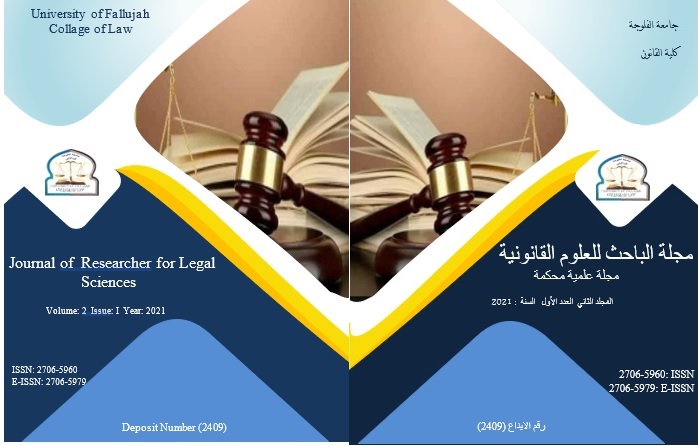
Amid the publication of the third issue of Researcher Journal for Legal Sciences, we reaffirm the journal’s academic policy of publishing research that addresses real-world legal issues. Researchers tackle these issues using a rigorous research methodology to arrive at appropriate solutions that may assist the legislative or judicial process in their work, or inspire other scholars to explore them across different legal fields with innovative ideas worthy of being placed in the hands of students and academics.
In line with this scientific and methodological approach, upheld by the Editor-in-Chief, the Managing Editor, and the Editorial Board, we note that certain papers submitted to the journal were rejected for failing to meet publication standards after being evaluated by expert reviewers.
In contrast, this issue came to light with a collection of scientific research distributed across various branches and specializations of law. In private law, the studies began with civil law, private international law, constitutional law, administrative law, civil procedural law, and public international law.
It is also worth noting that this issue has dedicated part of its academic space to studies and scholarly articles that comment on legal and judicial rulings.
Editor-in-Chief
Prof. Dr. Raed Naji Ahmed
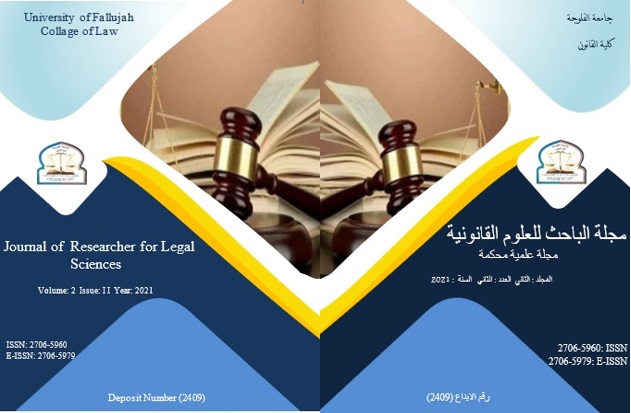
In the midst of publishing the fourth issue of Researcher Journal for Legal Sciences, we reaffirm the journal’s scholarly policy of publishing research that addresses legal challenges in real-world contexts. The aim is for researchers to tackle such issues through a rigorous academic methodology, offering appropriate solutions. These studies must present innovative ideas and contribute original scientific value worthy of being placed in the hands of legal scholars and students.
In reiterating this academic and methodological policy—adhered to by all parties involved in the journal, including the Editor-in-Chief, the Managing Editor, and the Editorial Board—we also emphasize that some submitted papers were rejected because they did not meet the standards of rigorous scientific research, as evaluated by the expert reviewers. Their judgments in this regard are final, without discussion or reconsideration, whether made by consensus or majority.
On the other hand, this issue saw the light as a result of receiving academic research papers that fulfilled all necessary scientific standards and met the required research criteria. These papers are a clear indication of the journal's commitment to a transparent, neutral, and objective methodology—shielded from any doubt or criticism.
The topics addressed in this issue vary, ranging from research tackling issues at the national legislative level to studies proposing legal solutions to problems emerging at the Arab or international legislative levels. The contributions span various branches of public and private law, authored by both Iraqi and Arab scholars.
In the field of private law, the included research papers cover:
Criminalization of Unfair Competition in Industrial Intellectual Property Transactions – A Study According to Algerian Law
Legal Mechanisms for Remedying Environmental Pollution Damage
The Legal Status of the Historian: A Study of the Civil Rights, Obligations, and Responsibilities of Historians
The Applicable Law to Enforcement Procedures Following the Declaration of Bankruptcy
In the field of public law, researchers addressed various issues within administrative, international, and criminal law, including:
The Legal System of the Federal Public Service Council
International Responsibility for Breach of Global Health Security
Criminal Protection of Health Security in Iraqi Legislation
Editor-in-Chief
Prof. Dr. Raed Naji Ahmed
December 2021

Preface
It is undoubtedly true that the intellectual product, especially the academic one, marked in a scientific research needs a specialized scientific journal that is subject to controls and conditions that preserve its rights and intellectual property. In this journal (The Researcher Journal for Legal Sciences) conditions and rules were set that were characterized by objectivity, and its main objective was to consolidate scientific research according to pre-defined mechanisms, including: the controls of scientific evaluation, language experience, publishing rules, conducting correspondence, tracking research, and requirements for electronic access. The journal’s editorial department has been keen to implement it to the letter so that the journal will be honestly a habitat for a purposeful scientific product that does not mix with impurities and does not affect the suspicions of scientific plagiarism, in addition to following clear and objective procedures in sending research and evaluation through the use of disciplined, transparent, impartial and confidential mechanisms aimed at giving confidence to the author of sober research That his idea will have a purely scientific evaluation tools away from all aspects of intellectual distortion or distortion. At the same time, these means aim to reassure the relevant scientific and academic bodies, especially the specialized scientific promotion committees in the various faculties of law (inside and outside Iraq), that what is published in the journal are solid and valuable research in which a well-appointed journal describes its truth and truth. Therefore, there is no fear of declaring that a number of research papers submitted to the journal were rejected after being evaluated for not being suitable for publication. Also, other researches were subject to modification based on the observations confirmed by the scientific expert. The journal did not issue any acceptance for publication until after the researcher took it and reconsidered it, and the researcher reviewed the modifications and observations confirmed in the scientific expert’s report.
We are about to launch the magazine’s first business, which is the first issue of it. It must be noted that it contained a variety of scientific research, in the branches of private and public law, presented by Iraqi and Arab researchers belonging to local and international scientific and administrative institutions. Some of them also dealt with current issues such as the Corona virus pandemic and its effects on legal aspects, as well as containing important comments on judicial decisions of the French Council of State. In conclusion, we ask God Almighty to make this issue a source of benefit and interest for all researchers, and a scientific source to enrich their intellectual productions.
Magazine Editor-in-Chief
Prof. Dr. Raed Naji Ahmed
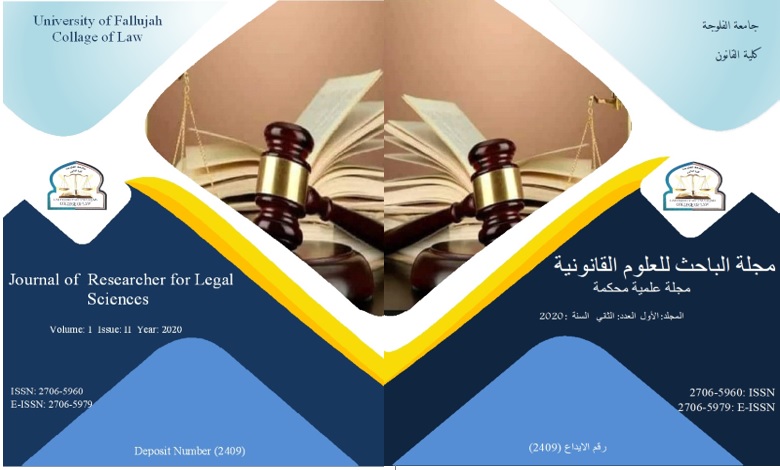
The concept of scientific research is evident across all fields of knowledge, and particularly in legal sciences, when addressing the issues that surface within economic and social life—issues that either lack legal regulation or are governed by existing legislation that suffers from shortcomings, deficiencies, or inefficiencies. As a result, legal solutions may fall short of encompassing new and emerging realities, or the mechanisms of their judicial and executive application may deviate from the intent and objectives of the legislator.
Here arises the role of the researcher, who—armed with scientific and intellectual tools—delves into these problems and potential solutions. The researcher critically examines the substance of these issues and ultimately puts forth opinions that may help guide the legislator in their legislative direction or draw the attention of judges in their rulings and interpretations. Accordingly, every legal researcher becomes part of the broader legal reform system.
This is precisely the idea behind Researcher Journal for Legal Sciences—which is now preparing to issue its second edition. The journal aims to explore issues that impact the legal environment and examine the available or aspirational solutions through research papers that meet rigorous academic and formal publishing standards. Based on this very principle, any submission that does not meet these criteria is transparently and objectively declined for publication, free from personal considerations. This is the journal's policy and it consistently adheres to it.
The articles included in this issue—like those in the previous one—span various branches of public and private law, including constitutional law, financial law, civil law, personal status law, commercial law, and more. They address numerous contemporary and evolving topics, especially in light of the COVID-19 pandemic and its ongoing mutations, whose effects remain evident across social and economic dimensions. This situation has necessitated a new outlook on legal regulation that differs from previously established legal norms.
Among the notable research topics in this issue related to personal status law are:
The impact of gender correction on personal status matters
The transfer of moral/intangible assets through wills and inheritance
In the field of commercial law, the issue includes:
Joint trademarks for airline companies
Settlement of commercial disputes through conciliation
In labor law, there is research on:
The impact of the COVID-19 pandemic on employment contracts
In the realm of intellectual property, one article examines:
The protection of biotechnological innovations
Finally, in financial law, two significant topics are addressed:
The legal framework for local authority funding sources and its challenges in Iraq
Electronic governance of the state during crises—with COVID-19 as a case study
|
This work is licensed under a Creative Commons Attribution-NonCommercial 4.0 International License. |
